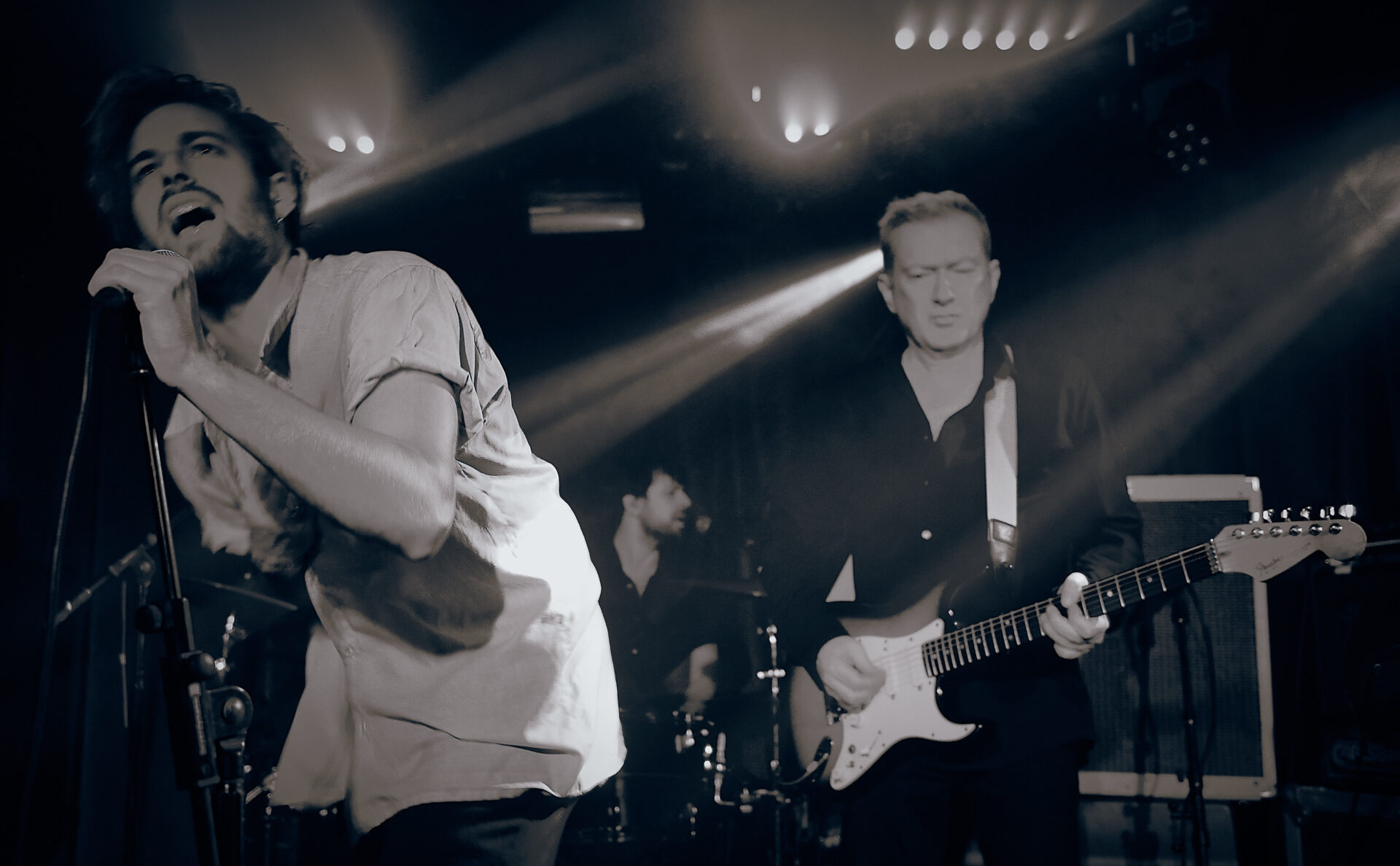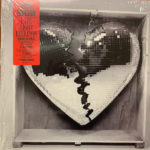2019 saw Gang of Four release their 9th studio album Happy Now, an intriguing record that fuses synth-pop and funk with lyrics about the anxieties of 21st century existence. This year is also the 40th anniversary of their seminal record Entertainment! and a corresponding tour to celebrate. We caught up with guitarist and band leader Andy Gill to discuss Happy Now, working with Adam Curtis and making the 490th best album of all time.
How are you feeling now that your latest record Happy Now is finally out? It had a fairly difficult release didn’t it?
Things have been a little bit screwed up around this release because Pledge Music collapsed and went bankrupt. That was very disastrous for very many bands who were hit a bit harder than we were. But still, it was enormously difficult. You try and do this in an organised way and get your record out and get things planned. And then suddenly you hear what is effectively the record company has gone bust. It was a bit like ‘ah, what the fuck do we do now?’ The record kept getting pushed back; I think it was pushed back twice. When you’re trying to get a record in January which is great for getting gigs and festivals and stuff for the summer, so none of that ends up happening. But nevertheless we have nice bunch of stuff for the summer, in lots of nice places. We’re going to Australia and Japan and then to China I think.
What’s it like playing in China?
We’ve played there a couple of time before – great, great audiences.
I don’t think loads of touring bands do they?
They get more than you would think, it’s always a bit problematic though. I remember when we played there last time, which was about three years ago – I got told this story by a local about when Sonic Youth played and the authorities decided that the gig couldn’t happen. They were there but they were told they couldn’t play so they called themselves something else and played anyway, and it was fine. It is bizarre. And Gang of Four being called Gang of Four, we were advised to call ourselves the Band of Four to soften the association with the Cultural Revolutionaries.
Did you?
Yeah we did. But it’s all kind of word of mouth there, everyone knows what’s going on but you have to play the game a bit.
You have obviously been making music for a fair while now. Are you able to write each song as an individual or because you know you are always making the next album, are you always thinking how does this fit within the larger structure of a record?
In a back of my mind kind of way, yeah but it’s not something I plot out. I’m sort of conscious of the things I have done in the past and the things I want to repeat, or not. You go about working on a song and you see what the potential of the song is or where it might go. At a certain point you push the song this way and push the song that way and eventually it speaks to you and tells you where it wants to go. That sounds a bit New Age but it sort of becomes ‘let’s follow this route’ and you don’t tend to think about in terms of an album.
And do you have a general rule as to what come first, lyrics or music?
It varies really, I’m always stock-piling ideas from things you hear people say or things you hear on commercials – they’re a great source of inspiration. When people are trying to sell you something, the hoops people jump through to sell you something and pretend they are not. A lot of them, especially British adverts, they go through periods when they get very sophisticated. And I make little notes about things that inspire me, like TV and films or just whenever you over hear something. So I have this huge bank of stuff and at some point I’ll try and make sense of it, and how it will work as I’m putting the songs together. Generally speaking, music and beats come first but there are notable exceptions where the words come first or come simultaneously.
The music of the record, while there is complexity but there is a definite pop sheen to it.
That’s got a lot to do with me working in studios for so many years and having mixed and produced so many different bands. The first album Entertainment! there wasn’t really a producer in the room, the engineer was really surprised when we gave him a production credit, surprised and delighted! But we were beginners and that has a rough and ready sound. I remember being in New York and we were at the very flash apartment of the boss of Warners and he invited us for dinner, this must have been 1980 or 81. And on the walls of his apartment he had Picassos and all these multi-million works of art. He played a couple of tracks of Entertainment! and I thought ‘well that sounds alright.’ And then he played the last thing he’d done with Bob Dylan or something and Dylan sounded so sonically amazing and compared to us I felt kind of crestfallen and I recognised the amateurish nature of our record.
For Happy Now you worked with four producers, what was that experience like? Because that is quite rare unless you’re making like a pop album that has multiple songwriters and stuff.
I think it started out as a bit of an experiment. Ben Hillier I liked a lot of the stuff he’d done, Ross Horton people had told me about him and he’s quite a character and I think he co-produced one or two but he mixed couple more, and I like his mixing a lot, it’s pretty heavy – which is good for some of the funkier tracks. Then there were these producers called Decoy and they like to be mysterious.
Did you give them the tracks to do or did you send them demos and they picked themselves?
They [Decoy] had a bit of input, I’d have various songs and they were kind of the school ‘what if you did this with it? What if we changed that arrangement there?’ They were more involved, and they have song writing credits on couple of tracks. Whereas Ross and Ben were more like this is the song and we’re just going to make it sound good. Whereas Decoy got more involved with changing the song but it’s always a bit of experiment. On the previous record What Happens Next? it was only me and there were times when I was on my own in the studio. In the first place, it takes much longer because of the temptation to teak and keep going over and over things. Also, if you get stuck and you are on your own, you can just go and watch telly for a bit, but if there is someone else around it gives you more discipline. And I like having other people’s opinions about how something should go.
Do you think with the next record you’ll do something similar?
One of things about doing this last record is, partly because what I just described, we got quite a good momentum going. I would start quite early and then whoever it was that working at the point would come in and then we’d work until 7 or 8 in the evening. We were working quite long hours, but we got lots done, I think the momentum of achieving things feeds back on itself, which encourages you to do more. So from a standing start, I had a few demos, to having a lot of finished tracks in a relatively short period of time was a really satisfactory way of doing it. And I would definitely want to do it again.
I’m only going to ask you one question about Entertainment! because I imagine you’re sick of talking about it. But according to Rolling Stone magazine it is the 490th best album of all time, which is so oddly specific. I wondered how you felt about that?
It’s kind of weird, isn’t it? So that was the top 500 albums of all time?
Yeah, and Entertainment! came in at 490.
Well, it’s a question of whether if you are a glass half full person I suppose but I am glad to be in there top 500. But it is a slightly odd thing that you are that specific number. I think it was The Guardian about a few weeks ago, had me as the 8th most important guitarist since 1975, which again is an odd number to be. But the media love listing things, and it usually doesn’t stretch to 500 but I’ll take it!
I saw that you produced the first Young Knives record, which I didn’t know at the time. I was about 14 when that came out and I loved it. What are your memories of working on that?
It was an extremely fun time and the two brothers are quite good comedians and especially Henry. Sometimes working on that record, you’d be talking something and then for some reason Henry would be start doing an impression of a bluebottle dying and buzzing around the studio until he collapsed on the floor. Which sounds stupid but it would have me crying with laughter. I’m rather proud of that record; I think its enormously good. They were up for the Mercury Prize as well, but I think the next record they did they slightly went off on the wrong track. Which is a shame because I don’t think really do anything now but it’s a great record and fantastic cover.
I’m also a massive Adam Curtis fan and you did the theme tune to a documentary series he did in 1993 called Pandora’s Box. How did that come about?
I’ve been friends with Adam for such a long time because we were at school at together. What he likes most is to go down the pub and have a couple of pints of the cheapest lager they’ve got. If you ask him what drink he wants he’ll just say, ‘the cheapest lager please.’ He’s sort of against what he would think of as expensive restaurants, he wants things to be cheap. It’s not that he’s tight; it’s just part of his makeup. Anyway, he had the basic idea for the music he wanted, he had this Russian military music he wanted adapting and I just played around with it.
You mentioned commercials earlier and you’ve written music for commercials yourself. The music you wrote for the Ford cinema commercial is really great, what it’s like working on a big commercial like that?
They gave me the bit of film they had, and I thought about it and came up with that. Someone who I know who is a great singer, I just got her to something some abstract stuff over the top and then I reversed the vocals, which gives it a slightly romantic, spooky feeling. I’m glad you spotted that one, that’s great. It’s not exactly what you would do if left to you own devices because someone asks you to make something to work with a bit of film, but I enjoy it anyway. I haven’t done any of that for ages actually, but I wouldn’t mind doing that again, it’s fun.
I’m asking this without any hint of sneer because I think people who criticise artists for doing adverts are idiots, but do you find it creatively challenging or do you do it for the money?
No, I do find it an interesting challenge and occasionally I’ve done bits of music for film or TV, and it’s not necessarily what I would do normally but that’s the point – you’re doing something that works with that imagery. I like the challenge and often I’ve done it for things where there isn’t a lot of money involved but I’ve done it anyway. And I think it’s ridiculous the way people criticise. For example, there was a thing when our song ‘Natural’s Not in It’ was used in a global Xbox advert, they asked and I was like ‘Yeah, 100%.’ They paid a lot of money for that but also it sort of fits so well because the first line of that song, ‘The problem of leisure/what to do for pleasure’, well what you do is you sit down with your Xbox and play videos games. It just conceptually felt like a really happy marriage and I was happy for them to use it, and happy to get some money as well. The music business, especially these days, is not an easy place to occupy and it can be a struggle. The way it works is, you do a lot of stuff and you don’t get much money for it and then now and again a little windfall come in. And people should be glad musicians get that now and then.




